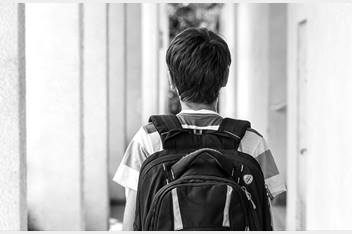Teen Suicide Prevention through a New Interactive Online Program

An engaging new evidence-informed program will teach teenagers suicide prevention and education content through an innovative format using elements inspired by video games.
Be Present Ohio: The Online Experience (BPO:XP), was created by mental health experts to help students navigate difficult topics like suicide and mental health through a medium they likely find familiar and engaging. It’s not exactly a video game, but it does use some reward elements of video games, like coins and gear upgrades, to keep players engaged.
The program is the result of a collaboration between the Ohio Suicide Prevention Foundation, which operates the Be Present Ohio initiative, and the Center for Suicide Prevention and Research at Nationwide Children’s Hospital, which developed the core content. The Ohio Department of Mental Health and Addiction Services provided additional funding and support.
“BPO:XP makes foundational suicide prevention training accessible to schools and communities in a way we've never seen before,” says Evi Roberts, the Youth Program and Policy Manager at the Ohio Suicide Prevention Foundation. “The program makes it easy for caring adults to bring life-saving suicide prevention to their students with engaging, online modules developed by experts in suicide prevention and educational design.”
The program, which will be available to schools and community organizations this fall, encourages students to talk openly about mental health while they learn the warning signs of suicide, the importance of reaching out for support and how to build a coping skills “toolkit.”
According to John Ackerman, PhD, a child clinical psychologist and suicide prevention coordinator for the Center for Suicide Prevention and Research at Nationwide Children's, BPO:XP’s development began approximately two years ago.
“The question that we set out to answer was, how can we leverage technology to provide a format that engages young learners around the topic of mental health in terms of how they already consume information?” he says.
The program was designed to be simple for schools and community organizations to implement. Groups of teenagers play through the experience in a group setting under the guidance of a facilitator. While facilitator training is provided by the Center for Suicide Prevention and Research, BPO:XP is largely self-directed. For the most part, all students need is a device, headphones and an Internet connection.
Students create a character or “avatar” that they can upgrade by earning points and unlocking achievements throughout each of the game’s three levels. Each level is designed to be completed in a 40-minute session; 20 minutes of interactive content – including short videos formatted after social media platforms like TikTok – and 20 minutes of group or solo “In Real Life (IRL) Quests” to reinforce how students can apply what they learned in their day-to-day lives.
Crucially, teens finish BPO:XP with a personalized “cope-ahead” worksheet that lists crisis resources, trusted adults in their lives and the skills they learned during the program. Ackerman explains that rather than telling students how they should cope, the program is flexible and collaborative, giving teens a voice in what’s in their coping toolkit so that it is more likely to be accessed when needed.
“A good coping plan is developed with a young person and is not prescriptive. We're not suggesting an easy fix or a simple solution to eliminate all of life’s problems. In terms of coping during a crisis, we a building off of what we know works best,” he says. “We’re empowering the young person.”
A 2021 Ohio law mandates that school districts include at least one hour each school year of evidence-based instruction on suicide awareness and prevention in grades 6-12. Currently, the Ohio Department of Education has approved six such programs, including SOS Signs of Suicide®, which Nationwide Children’s has helped implement for free in school districts across 22 Ohio counties.
“BPO:XP is a wonderful enhancement to those programs,” says Dr. Ackerman. “We know that one hour of training on suicide prevention is probably not adequate for student mental health support for the entire year.”
During the program’s development, more than 1,000 young people were surveyed to make sure teens connected with the content in a way that truly makes an impact. BPO:XP is a carefully crafted, evidence-informed experience that aims to make a lasting impact on teens by meeting them where they are.
“The content has been vetted by mental health experts and designed with best practices for how kids learn and apply that learning to the real world,” says Dr. Ackerman. “It's going to give students messages of hope with a focus on coping, connection and practical tools to get through challenging times.”
Last Updated: January 2024



